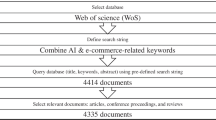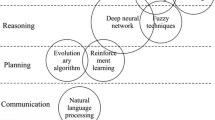Abstract
In recent years, the rapid development of the Internet has promoted the continuous expansion of the scale of China’s tourism industry, and the amount of tourism data has surged. However, tourists need help bringing personal interest and high-value data from the plethora of tourism information. The rise of artificial intelligence has transformed traditional tourism into an intelligent, data-driven industry. This shift has generated vast tourism data, offering both opportunities and challenges. The paper discusses an AI and IoT-based Intelligent Tourism Recommendation System (ITRS) that offers travelers predefined itineraries, personalized suggestions, and tourism insights. This system simplifies attraction discovery, unveiling hidden value within tourism data at the intersection of AI and IoT. The present study thoroughly investigates AI-based recommendation algorithms before delving into the system’s architecture. It categorizes user-based, project-based, and article-based collaborative filtering methodologies tailored to specific goals. First, thoroughly examine AI-based recommendation algorithms before delving into the system architecture. Second, categorize collaborative filtering methods as user-based, project-based, and article-based, each tailored to specific objectives. Third, delve into the Apriori algorithm’s complexity within the context of weighted association rules and introduce an enhanced iteration for improved efficiency. The proposed scheme encompasses an elaborate ITRS plan featuring a user interest model and a client module, crucial for the computation and analysis of users’ long-term and short-term interests. Rigorous performance testing confirms the ITRS’s superiority across varying support levels, with experimental results demonstrating the Apriori algorithm’s exceptional accuracy, achieving a 94.3% improvement over other methods. The Apriori algorithm is better than traditional recommendation algorithms such as Linear Regression, Logistic Regression, Decision Trees, Random Forest, Support Vector Machines, K-nearest neighbor, Naive Bayes, and XGBoost.






















Similar content being viewed by others
Data availability
The data that support the findings of this study are available from the corresponding author, upon reasonable request.
References
Al Fararni K, Nafis F, Aghoutane B, Yahyaouy A, Riffi J, Sabri A (2021) Hybrid recommender system for tourism based on big data and AI: a conceptual framework. Big Data Min Anal 4(1):47–55
Ali M, Yin B, Kumar A, Sheikh AM, et al. (2020) Reduction of Multiplications in Convolutional Neural Networks. In 2020 39th Chinese Control Conference (CCC) (pp. 7406–7411). IEEE. DOI: https://doi.org/10.23919/CCC50068.2020.9188843
Arif YM, Harini S, Nugroho SMS, Hariadi M (2021) An automatic scenario control in serious game to visualize tourism destinations recommendation. IEEE Access 9:89941–89957
Aslam MS, Dai X, Hou J, Li Q, Ullah R, Ni Z, Liu Y (2020) Reliable control design for composite-driven scheme based on delay networked T-S fuzzy system. Int J Robust Nonlinear Control 30(4):1622–1642
Cao B, Zhao J, Lv Z, Yang P (2020) Diversified personalized recommendation optimization based on mobile data. IEEE Trans Intell Transp Syst 22(4):2133–2139
Cao K, Ding H, Wang B, Lv L, Tian J, Wei Q, Gong F (2022) Enhancing physical-layer security for IoT with nonorthogonal multiple access assisted semi-grant-free transmission. IEEE Internet Things J 9(24):24669–24681
Chen Z (2019) Observer-based dissipative output feedback control for network T-S fuzzy systems under time delays with mismatch premise. Nonlinear Dyn 95:2923–2941
Chen J, Zhao C, Uliji, Chen L (2020) Collaborative filtering recommendation algorithm based on user correlation and evolutionary clustering. Complex Intell Syst 6:147–156
Cheng B, Zhu D, Zhao S, Chen J (2016) Situation-aware IoT service coordination using the event-driven SOA paradigm. IEEE Trans Netw Serv Manag 13(2):349–361
Cheng B, Wang M, Zhao S, Zhai Z, Zhu D, Chen J (2017) Situation-aware dynamic service coordination in an IoT environment. IEEE/ACM Trans Netw 25(4):2082–2095
Gupta M, Thakkar A, Gupta V, Rathore DPS (2020) Movie recommender system using collaborative filtering. In 2020 international conference on electronics and sustainable communication systems (ICESC) (pp. 415–420). IEEE
Hamid RA, Albahri AS, Alwan JK, Al-Qaysi ZT, Albahri OS, Zaidan AA, Alnoor A, Alamoodi AH, Zaidan BB (2021) How smart is e-tourism? A systematic review of smart tourism recommendation system applying data management. Comput Sci Rev 39:100337
Hazrat B, Yin B, Kumar A, Ali M, Zhang J, Yao J (2023) Jerk-bounded trajectory planning for rotary flexible joint manipulator: an experimental approach. Soft Comput 27(7):4029–4039. https://doi.org/10.1007/s00500-023-07923-5
Ho CL, Chen WL, Ou CH (2023) Constructing a personalized travel itinerary recommender system with the Internet of Things. Wireless Netw. https://doi.org/10.1007/s11276-023-03453-y
Jiang H, **ao Z, Li Z, Xu J, Zeng F, Wang D (2020) An energy-efficient framework for internet of things underlaying heterogeneous small cell networks. IEEE Trans Mob Comput 21(1):31–43
Kong Y (2023) Real-time processing system and Internet of Things application in the cultural tourism industry development. Soft Comput 27(14):10347–10357
Korzun D, Semenov A, Balandin S (2022) Exhibition Area Digitalization Using IoT Sensorios and Application to Smart Tourism Services. In 2022 31st Conference of Open Innovations Association (FRUCT) (pp. 109–114). IEEE
Kumar A, Shaikh AM, Li Y et al (2021) Pruning filters with L1-norm and capped L1-norm for CNN compression. Appl Intell 51:1152–1160. https://doi.org/10.1007/s10489-020-01894-y
Leung R (2022) Development of information and communication technology: from e-tourism to smart tourism. Handbook of e-tourism. Springer International Publishing, pp 1–33
Li T, Fan Y, Li Y, Tarkoma S, Hui P (2021) Understanding the long-term evolution of mobile app usage. IEEE Trans Mobile Comput. https://doi.org/10.1109/TMC.2021.3098664
Liu X, Zhou G, Kong M, Yin Z, Li X, Yin L, Zheng W (2023a) Develo** multi-labelled corpus of twitter short texts: a semi-automatic method. Systems 11(8):390
Liu X, Shi T, Zhou G, Liu M, Yin Z, Yin L, Zheng W (2023b) Emotion classification for short texts: an improved multi-label method. Humanit Soc Sci Commun 10(1):1–9
Lu S, Liu M, Yin L, Yin Z, Liu X, Zheng W (2023a) The multi-modal fusion in visual question answering: a review of attention mechanisms. PeerJ Comput Sci 9:e1400
Lu S, Ding Y, Liu M, Yin Z, Yin L, Zheng W (2023b) Multiscale feature extraction and fusion of image and text in VQA. Int J Comput Intell Syst 16(1):54
Lv Z, Shang W (2022) Impacts of intelligent transportation systems on energy conservation and emission reduction of transport systems: a comprehensive review. Green Technol Sustain. https://doi.org/10.1016/j.grets.2022.100002
Mishra S, Tyagi AK (2022) The role of machine learning techniques in internet of things-based cloud applications. Artificial intelligence-based internet of things systems. Springer International Publishing, pp 105–135
Nawara D, Kashef R (2021) Context-aware recommendation systems in the IoT environment (IoT-CARS)—a comprehensive overview. IEEE Access 9:144270–144284
Nitu P, Coelho J, Madiraju P (2021) Improvising personalized travel recommendation system with recency effects. Big Data Mining and Analytics 4(3):139–154
Pramod D, Bafna P (2022) Conversational recommender systems techniques, tools, acceptance, and adoption: a state of the art review. Expert Syst Appl 203:117539
Shamrooz M, Li Q, Hou J (2021) Fault detection for asynchronous T-S fuzzy networked Markov jump systems with new event-triggered scheme. IET Control Theory Appl 15(11):1461–1473
Shamrooz Aslam M, Qaisar I, Majid A, Shamrooz S (2023) Adaptive event-triggered robust H∞ control for Takagi-Sugeno fuzzy networked Markov jump systems with time-varying delay. Asian J Control 25(1):213–228
Shen Y, Ding N, Zheng HT, Li Y, Yang M (2020) Modeling relation paths for knowledge graph completion. IEEE Trans Knowl Data Eng 33(11):3607–3617
Su X, Sperlì G, Moscato V, Picariello A, Esposito C, Choi C (2019) An edge intelligence-empowered recommender system enabling cultural heritage applications. IEEE Trans Industr Inf 15(7):4266–4275
Ullah R, Dai X, Sheng A (2020) Event-triggered scheme for fault detection and isolation of non-linear system with time-varying delay. IET Control Theory Appl 14(16):2429–2438
Wang L, Zhai Q, Yin B et al. (2019) “Second-order convolutional network for crowd counting”, Proc. SPIE 11198, Fourth International Workshop on Pattern Recognition. 111980T. https://doi.org/10.1117/12.2540362
Wang W, Kumar N, Chen J, Gong Z, Kong X, Wei W, Gao H (2020a) Realizing the potential of the internet of things for smart tourism with 5G and AI. IEEE Netw 34(6):295–301
Xu H, Sun Z, Cao Y et al (2023) A data-driven approach for intrusion and anomaly detection using automated machine learning for the Internet of Things. Soft Comput. https://doi.org/10.1007/s00500-023-09037-4
Yao W, Guo Y, Wu Y, Guo J (2017) Experimental validation of fuzzy PID control of flexible joint system in presence of uncertainties. In 2017 36th Chinese Control Conference (CCC) (pp. 4192–4197). IEEE. DOI: https://doi.org/10.23919/ChiCC.2017.8028015
Yin B, Khan J, Wang L, Zhang J, Kumar A (2019) Real-time lane detection and tracking for advanced driver assistance systems. In 2019 Chinese Control Conference (CCC) (pp. 6772–6777). IEEE. DOI: https://doi.org/10.23919/ChiCC.2019.8866334
Yin B, Aslam MS et al (2023) A practical study of active disturbance rejection control for rotary flexible joint robot manipulator. Soft Comput 27:4987–5001. https://doi.org/10.1007/s00500-023-08026-x
Yochum P, Chang L, Gu T, Zhu M (2020) Linked open data in location-based recommendation system on tourism domain: a survey. IEEE Access 8:16409–16439
Zhang J, Peng S, Gao Y, Zhang Z, Hong Q (2023a) APMSA: adversarial perturbation against model stealing attacks. IEEE Trans Inf Forensics Secur 18:1667–1679
Zhang Y, Shao Z, Zhang J, Wu B, Zhou L (2023b) The effect of image enhancement on influencer’s product recommendation effectiveness: the roles of perceived influencer authenticity and post type. J Res Interact Mark. https://doi.org/10.1108/JRIM-09-2022-0286
Funding
No funding was provided for the completion of this study.
Author information
Authors and Affiliations
Corresponding author
Ethics declarations
Conflict of interest
The authors have no relevant financial or non-financial interests to disclose. The authors declare that they have no conflict of interest.
Ethical approval
This article does not contain any study with human participants or animals performed by the authors.
Additional information
Publisher's Note
Springer Nature remains neutral with regard to jurisdictional claims in published maps and institutional affiliations.
Rights and permissions
Springer Nature or its licensor (e.g. a society or other partner) holds exclusive rights to this article under a publishing agreement with the author(s) or other rightsholder(s); author self-archiving of the accepted manuscript version of this article is solely governed by the terms of such publishing agreement and applicable law.
About this article
Cite this article
Song, Y., He, Y. Toward an intelligent tourism recommendation system based on artificial intelligence and IoT using Apriori algorithm. Soft Comput 27, 19159–19177 (2023). https://doi.org/10.1007/s00500-023-09330-2
Accepted:
Published:
Issue Date:
DOI: https://doi.org/10.1007/s00500-023-09330-2




